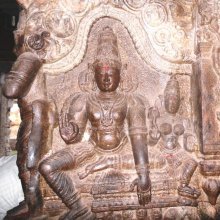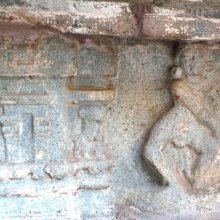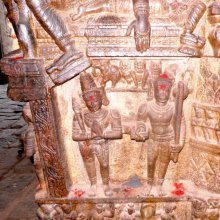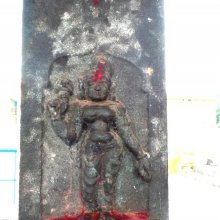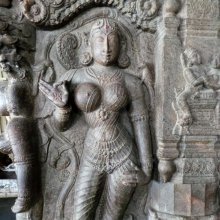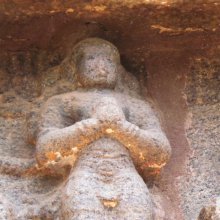Ura, Uṟa, Ūrā: 18 definitions
Introduction:
Ura means something in Hinduism, Sanskrit, Buddhism, Pali, the history of ancient India, Marathi, Jainism, Prakrit, Hindi, biology, Tamil. If you want to know the exact meaning, history, etymology or English translation of this term then check out the descriptions on this page. Add your comment or reference to a book if you want to contribute to this summary article.
Images (photo gallery)
(+117 more images available)
In Hinduism
Ayurveda (science of life)
Source: gurumukhi.ru: Ayurveda glossary of termsUra (उर):—[uraḥ] Thorax. The part of the human body enclosed by the ribs and sternum. The major seat of Kapha.

Āyurveda (आयुर्वेद, ayurveda) is a branch of Indian science dealing with medicine, herbalism, taxology, anatomy, surgery, alchemy and related topics. Traditional practice of Āyurveda in ancient India dates back to at least the first millenium BC. Literature is commonly written in Sanskrit using various poetic metres.
India history and geography
Source: Mandala Texts: Yakchoe: The Grand Festival of Ura VillageUra refers to the village Ura Makrong in Bhutan.—Ura is named after Urgyen Guru Rinpoche, also known as Padmasambhava, the great Indian mystic credited with bringing Buddhism to Bhutan in the 8th century. Older people in the region still call the valley Urbay, the hidden valley of Urgyen Rinpoche. Ura Makrong, as the term suggests, is the main village. The village is also known as Dozhi, or four sections, as Ura village is composed of four administrative divisions through which it is traditionally organized and run. A thriving community, the village produced leading religious figures, statesmen, scholars and artists throughout Bhutan’s history.

The history of India traces the identification of countries, villages, towns and other regions of India, as well as mythology, zoology, royal dynasties, rulers, tribes, local festivities and traditions and regional languages. Ancient India enjoyed religious freedom and encourages the path of Dharma, a concept common to Buddhism, Hinduism, and Jainism.
Biology (plants and animals)
Source: Wisdom Library: Local Names of Plants and DrugsUra [उरा] in the Marathi language is the name of a plant identified with Falconeria insignis Royle from the Euphorbiaceae (Castor) family having the following synonyms: Sapium insigne, Falconeria malabarica, Excoecaria insignis. For the possible medicinal usage of ura, you can check this page for potential sources and references, although be aware that any some or none of the side-effects may not be mentioned here, wether they be harmful or beneficial to health.
Source: Google Books: CRC World Dictionary (Regional names)1) Ura in Guinea is the name of a plant defined with Digitaria longiflora in various botanical sources. This page contains potential references in Ayurveda, modern medicine, and other folk traditions or local practices It has the synonym Paspalum longiflorum Retzius (among others).
2) Ura in India is also identified with Falconeria insignis It has the synonym Sapium insigne var. malabaricum (Wight) Hook.f. (etc.).
3) Ura is also identified with Hardwickia binata.
Example references for further research on medicinal uses or toxicity (see latin names for full list):
· Plants of the Coast of Coromandel (1795)
· Florae Africae Australioris Illustrationes Monographicae (1841)
· Flora Indica; or descriptions … (1820)
· Annual Report of the Missouri Botanical Garden (1899)
· Blumea (1973)
· Wissenschaftliche Ergebnisse der Schwedischen Rhodesia-Kongo-Expedition, 1911–1912, unter Leitung von Eric Graf von Rosen (1911)
If you are looking for specific details regarding Ura, for example pregnancy safety, diet and recipes, side effects, extract dosage, health benefits, chemical composition, have a look at these references.

This sections includes definitions from the five kingdoms of living things: Animals, Plants, Fungi, Protists and Monera. It will include both the official binomial nomenclature (scientific names usually in Latin) as well as regional spellings and variants.
Languages of India and abroad
Pali-English dictionary
Source: BuddhaSasana: Concise Pali-English Dictionaryura : (m.; nt.) the breast; chest.
Source: Sutta: The Pali Text Society's Pali-English DictionaryUra, (m. nt.) & Uro (nt.) (Sk. uras) — 1. the breast, chest.—Cases after the nt. s. -declension are Instr. urasā Th. 1, 27; Sn. 609; & Loc. urasi Sn. 255; J. III, 148; IV, 118, also urasiṃ J. III, 386 (= urasmiṃ C.). Other cases of nt. a-stem, e.g. Instr. urena J. III, 90; PvA. 75; Loc. ure D. I, 135; J. I, 156, 433, 447; PvA. 62 (ure jāta; cp. orasa).—Vin. II, 105 (contrasted with piṭṭhi back); IV, 129; J. IV, 3; V, 159, 202; Nd2 659; Pv IV. 108; DhA. III, 175; DA. I, 254; DhsA. 321; PvA. 62, 66.—uraṃ deti (with Loc.) to put oneself on to something with one’s chest, fig. to apply oneself to J. I, 367, 401, 408; III, 139, 455; IV, 219; V, 118, 278.—2. (appld. ) the base of a carriage pole Vv 6328 (= īsāmūla VvA. 269).

Pali is the language of the Tipiṭaka, which is the sacred canon of Theravāda Buddhism and contains much of the Buddha’s speech. Closeley related to Sanskrit, both languages are used interchangeably between religions.
Marathi-English dictionary
Source: DDSA: The Molesworth Marathi and English Dictionaryurā (उरा).—m A low and flat place (in a river) appearing at low water; a shallow or shoal.
--- OR ---
ūra (ऊर).—m (ura S) The breast. Pr. urīṃ kēśa māthāṃ ṭakala What is gained in one way is lost in another. ūra kāḍhūna cālaṇēṃ To strut haughtily or pompously. ūra daḍapaṇēṃ, g. of s. To sink or be oppressed at heart; to lose courage or spirit (through envy, fright, bashfulness &c.) ūra dabaṇēṃ-basaṇēṃ-phāṭaṇēṃ-ulaṇēṃ To be alarmed or amazed. ūra dāṭaṇēṃ or bharaṇēṃ g. of s. To have infarction or stuffing in the chest. 2 To be overcome with violent emotion (as of sorrow, affection &c.) ūra pikaṇēṃ g. of s. To have one's throat stuffed with thick phlegm. 3 To be chest-strained from wearisome teaching or speaking or other fatiguing labor. ūra phuṭaṇēṃ g. or acc. of s. and m pl To arrive at the age at which the breasts form--a female. ūra phōḍaṇēṃ To make great efforts. 2 g. of o. To knock up by overworking; to make to chestfounder. ūra baḍaviṇēṃ To clap the breast (in admiration, self-congratulation, or compunction). urālā hāta lāvaṇēṃ To assert determination, or self-confidence, or truthfulness. urā pōṭāvara ucalaṇēṃ To lift, carry, perform, do, with vehement effort. urāvara asaṇēṃ To be in authority over. urāvara ghēṇēṃ To take up (any hard or great matter) to perform. urāvara dhōṇḍā ṭhēvaṇēṃ To repress one's feelings; to put a force upon one's self. urāvara basaṇēṃ (To lie upon one's breast.) To be imperatively incumbent or urgent--a duty: to be felt as a load or check. urāvara hāta ṭhēvaṇēṃ or lāvaṇēṃ or ṭhēvūna or lāvūna sāṅgaṇēṃ or bōlaṇēṃ To promise or protest vehemently: also to aver or affirm truly, positively, assuredly. urāsīṃ dharaṇēṃ To beseech humbly and earnestly. 2 To clasp and hug affectionately. urīṃ ḍōṅgara ghēṇēṃ To undertake a great work: also to take great pains or trouble. And urīṃ ḍōṅgara purīṃ kāṭhyā ghēṇēṃ (To carry a hill upon one's breast, and to drag out thorny bushes from the freshes of the river) is to undergo hard labor, and to adopt all variety of expedients (to obtain a living &c.) urīṃ pōṭīṃ karaṇēṃ To strain hard; to exert one's self; to strive strenuously. urīṃ pōṭīṃ dharaṇēṃ To embrace with ardor of affection. Used generally, as dādā bābā karaṇēṃ and similar phrases, signifying To use persuasive, endearing, or mollifying arts. urīṃ phuṭaṇēṃ or bharaṇēṃ To be chestfoundered; to knock up (from exertion).
--- OR ---
ūra (ऊर).—f (urvarita S) Deficiency &c. Used as uratā f q. v. 2 Remainder or residue; the portion left or the portion remaining over. 3 n m (Or aura for pura) A flood or a river-fresh.
Source: DDSA: The Aryabhusan school dictionary, Marathi-Englishūra (ऊर).—m The breast. f Remainder; defici- ency. ūra kāḍhuna cālaṇēṃ Strut haughtily. ūra dāṭaṇēṃ-bharaṇēṃ Be overcome with violent emotion (as of sorrow). urālā hāta lāvaṇēṃ To assert determination or self-confi- dence or truthfulness. urāvara hāta ṭhēvaṇēṃ or lāvaṇēṃ or ṭhēvūna or lāvūna sāṅgaṇēṃ To promise or protest vehemently. To aver or affirm positively or assuredly. ūra phōḍaṇēṃ, ūrīṃ ḍōṅgara ghēṇēṃ, ūrīṃ pōṭīṃ karaṇēṃ To make great efforts, to strain hard, to strive strenu- ously. urāśīṃ dharaṇēṃ Clasp and hug affee- tionately. urīṃ phuṭaṇēṃ Be chest-founder- ed; knock up (from exertion).
Marathi is an Indo-European language having over 70 million native speakers people in (predominantly) Maharashtra India. Marathi, like many other Indo-Aryan languages, evolved from early forms of Prakrit, which itself is a subset of Sanskrit, one of the most ancient languages of the world.
Sanskrit dictionary
Source: DDSA: The practical Sanskrit-English dictionaryUra (उर).—a. Going (Ved.).
-raḥ A sheep.
--- OR ---
Urā (उरा).—Ved. A ewe. अवीरे क्रतौ वि दविद्युतन्नोरा न मायुं (avīre kratau vi davidyutannorā na māyuṃ) Ṛgveda 1.95.3.
Source: Cologne Digital Sanskrit Dictionaries: Edgerton Buddhist Hybrid Sanskrit DictionaryUra (उर).—(s) [, womb? So according to Senart on Mahāvastu i.199.10 = ii.3.8 (verse), ed. divasāni sapta māsā ca daśa tasyā uram otaret. The meter is bad even so; mss. in i.199.10 read udare-m-, which suggests a form of udara, the word we should expect; I find no record of ura(s) in the required meaning Perhaps the orig. had something like…daśa tasyodar’ (for tasyā udaram or udare) otaret.]
Source: Cologne Digital Sanskrit Dictionaries: Shabda-Sagara Sanskrit-English DictionaryUra (उर).—Sautra root. (urati) to go.
Source: Cologne Digital Sanskrit Dictionaries: Cappeller Sanskrit-English DictionaryUra (उर).—[masculine] [Name] of a Ṛṣi; °— = uras or ūrṇā.
--- OR ---
Urā (उरा).—[feminine] a ewe.
Source: Cologne Digital Sanskrit Dictionaries: Monier-Williams Sanskrit-English Dictionary1) Urā (उरा):—[from uraṇa] a f. a ewe, [Ṛg-veda viii, 34, 3; x, 95, 3.]
2) b See under uraṇa, [column]2.
[Sanskrit to German]
Sanskrit, also spelled संस्कृतम् (saṃskṛtam), is an ancient language of India commonly seen as the grandmother of the Indo-European language family (even English!). Closely allied with Prakrit and Pali, Sanskrit is more exhaustive in both grammar and terms and has the most extensive collection of literature in the world, greatly surpassing its sister-languages Greek and Latin.
Hindi dictionary
Source: DDSA: A practical Hindi-English dictionaryUra (उर) [Also spelled ur]:—(nm) see [hṛdaya].
...
Prakrit-English dictionary
Source: DDSA: Paia-sadda-mahannavo; a comprehensive Prakrit Hindi dictionaryUra (उर) in the Prakrit language is related to the Sanskrit word: Uras.
Prakrit is an ancient language closely associated with both Pali and Sanskrit. Jain literature is often composed in this language or sub-dialects, such as the Agamas and their commentaries which are written in Ardhamagadhi and Maharashtri Prakrit. The earliest extant texts can be dated to as early as the 4th century BCE although core portions might be older.
Kannada-English dictionary
Source: Alar: Kannada-English corpusUra (ಉರ):—[noun] the fore or ventral part of the body between the neck and the abdomen; the chest; the breast; the bosom.
Kannada is a Dravidian language (as opposed to the Indo-European language family) mainly spoken in the southwestern region of India.
See also (Relevant definitions)
Starts with (+451): Ur-alipucal, Ur-aticayankatti, Ura Makrong, Ura Yakchoe, Ura-jiro-me-gi, Ura-sus, Uraba, Urabanem, Urabasavi, Urabatthi, Urabatti, Urabbha, Urabbhia, Urabbhijja, Urabbhiya, Urabheta, Urabhinna, Urabhra, Urabhrasarika, Urabhriya.
Ends with (+2833): Abandhura, Abhangura, Abhasura, Abhayapura, Abhayayura, Abhilashankura, Abhimanyupura, Abhipura, Abhrapura, Abhura, Abhyasashura, Abura, Acalagaura, Acalapura, Acaradura, Acaryadura, Acatura, Acaura, Acchaniura, Acchasura.
Full-text (+230): Uras, Urahsthala, Uraga, Urahsutrika, Urahkshaya, Urahkshata, Urashchada, Uram, Uraska, Urahkapata, Urashi, Urahshulin, Urahkshatakasa, Uramgama, Urahshula, Uramga, Urahshiras, Urahstha, Urobhushana, Uroja.
Relevant text
Search found 37 books and stories containing Ura, Urā, Ūra, Uṟa, Ūrā, Ūr-ā, Ur-a; (plurals include: Uras, Urās, Ūras, Uṟas, Ūrās, ās, as). You can also click to the full overview containing English textual excerpts. Below are direct links for the most relevant articles:
Rig Veda (translation and commentary) (by H. H. Wilson)
Garga Samhita (English) (by Danavir Goswami)
Verse 6.3.10 < [Chapter 3 - Lord Balarāma’s Wedding]
Verse 6.1.24 < [Chapter 1 - Jarāsandha’s Defeat]
Verses 2.24.19-22 < [Chapter 24 - The Story of Asuri Muni in the Rāsa-dance Pastime]
Nitiprakasika (Critical Analysis) (by S. Anusha)
Vyūhas—Composition < [Chapter 4]
The Religion and Philosophy of Tevaram (Thevaram) (by M. A. Dorai Rangaswamy)
Chapter 1 - The Light of Light < [Volume 4.2.3 - Philosophy of God]
Symbology of wearing skins in Shaivism < [Volume 2 - Nampi Arurar and Mythology]
Chapter 21 - Thirukalayanallur or Tirukkalaya Nallur (Hymn 16) < [Volume 3.2 - Pilgrim’s progress: to Chola]
Bhakti-rasamrta-sindhu (by Śrīla Rūpa Gosvāmī)
Verse 3.3.4 < [Part 3 - Fraternal Devotion (sakhya-rasa)]
Verse 3.4.29 < [Part 4 - Parenthood (vātsalya-rasa)]
Verse 3.4.63 < [Part 4 - Parenthood (vātsalya-rasa)]
Puranic encyclopaedia (by Vettam Mani)
